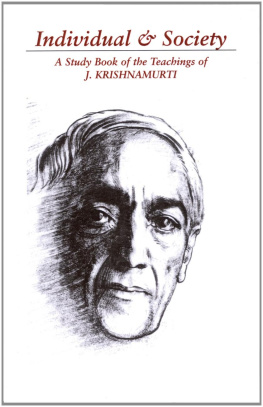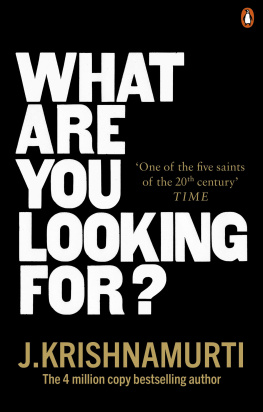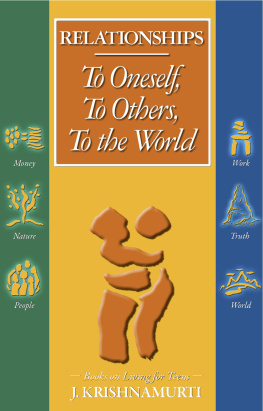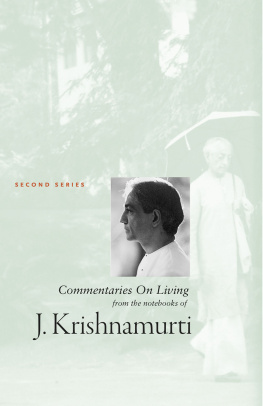Krishnamurti - Individual & Society
Here you can read online Krishnamurti - Individual & Society full text of the book (entire story) in english for free. Download pdf and epub, get meaning, cover and reviews about this ebook. publisher: Krishnamurti Foundation of America, genre: Religion. Description of the work, (preface) as well as reviews are available. Best literature library LitArk.com created for fans of good reading and offers a wide selection of genres:
Romance novel
Science fiction
Adventure
Detective
Science
History
Home and family
Prose
Art
Politics
Computer
Non-fiction
Religion
Business
Children
Humor
Choose a favorite category and find really read worthwhile books. Enjoy immersion in the world of imagination, feel the emotions of the characters or learn something new for yourself, make an fascinating discovery.
- Book:Individual & Society
- Author:
- Publisher:Krishnamurti Foundation of America
- Genre:
- Rating:4 / 5
- Favourites:Add to favourites
- Your mark:
- 80
- 1
- 2
- 3
- 4
- 5
Individual & Society: summary, description and annotation
We offer to read an annotation, description, summary or preface (depends on what the author of the book "Individual & Society" wrote himself). If you haven't found the necessary information about the book — write in the comments, we will try to find it.
Individual & Society — read online for free the complete book (whole text) full work
Below is the text of the book, divided by pages. System saving the place of the last page read, allows you to conveniently read the book "Individual & Society" online for free, without having to search again every time where you left off. Put a bookmark, and you can go to the page where you finished reading at any time.
Font size:
Interval:
Bookmark:
INDIVIDUAL & SOCIETY
THE BONDAGE OF CONDITIONING
A Selection of Passages
for the Study of the Teachings of
J. Krishnamurti
Krishnamurti Foundation
of America
P.O. Box 1560
Ojai, California 93024
INDIVIDUAL & SOCIETY:
The Bondage of Conditioning
A Selection of Passages For The Study of The Teachings of
J. Krishnamurti
1991 by the Krishnamurti Foundation of America.
All rights reserved. Printed in the United States of America.
No part of this book may be used or reproduced in any manner whatsoever without written permission except in the case of brief quotations embodied in critical articles and reviews.
For information and a complete catalogue of Krishnamurti
books, videotapes, and audiotapes write:
Krishnamurti Foundation of America
P.O. Box 1560, Ojai, California 93024
10 9 8 7 6 5 4 3 2
CONTENTS
A. Introduction
B. What is conditioning?
C. Factors of conditioning: organized religion, nationalism, governments
A. Desire, will, effort, choice
B. Power and authority
C. Reform
D. Analysis
E. Methods, systems, patterns
F. Self-improvement
A. Introduction
B. Krishnamurti: I say it is definitely possible for the mind to be free from all conditioning
C. Krishnamurti's approach
1. Awareness, attention
2. Self-knowledge (self-knowing)
3. Meditation
A. Finding one's vocation
B. Fear and discipline
C. Education and freedom
Editors Note
The passages in this volume have been taken directly from Krishnamurtis talks and books from 1933 through part of 1967. The compilers began by reading all the passages from this period which contained the words individual, society, or conditioning, the theme of this book. (This would not have been possible without the use of a full text computer database, produced by the Krishnamurti Foundation Trust of England.) Over 900 passages were studied in all.
The material selected has not been altered from the way it was originally printed except for limited editing of spelling, punctuation, and missing words. Words or phrases that appear in brackets are not Krishnamurtis, but have been added by the compilers for the sake of clarity. Ellipses introducing a passage, or ending it, indicate that the passage begins or ends mid-sentence. Ellipses in the course of a passage indicate the omission of words or sentences. Captions, set off from the body of the text, have been used with many passages. Most captions are statements taken directly from the text, with some being a combination of phrases from the passage.
Krishnamurti spoke from such a large perspective that his whole vision was implied in any extended passage. If one wishes to see how a statement flows out of his whole discourse, one can find the context through the reference at the foot of each passage. These refer primarily to talks which have recently been published as The Collected Works of J. Krishnamurti. These seventeen volumes cover the entire period from which this study book has been drawn. A complete bibliography is included at the end of this book.
Albion W. Patterson
Series Editor
Talking things over together as two friends
In a few days we are going to have discussions, and we can start those discussions this morning. But if you assert and I assert, if you stick to your opinion, to your dogma, to your experience, to your knowledge, and I stick to mine, then there can be no real discussion because neither of us is free to inquire. To discuss is not to share our experiences with each other. There is no sharing at all; there is only the beauty of truth, which neither you nor I can possess. It is simply there.
To discuss intelligently, there must also be a quality not only of affection but of hesitation. You know, unless you hesitate, you can't inquire. Inquiry means hesitating, finding out for yourself, discovering step by step; and when you do that, then you need not follow anybody, you need not ask for correction or for confirmation of your discovery. But all this demands a great deal of intelligence and sensitivity.
By saying that, I hope I have not stopped you from asking questions! You know, this is like talking things over together as two friends. We are neither asserting nor seeking to dominate each other, but each is talking easily, affably, in an atmosphere of friendly companionship, trying to discover. And in that state of mind we do discover, but I assure you, what we discover has very little importance. The important thing is to discover, and after discovering, to keep going. It is detrimental to stay with what you have discovered, for then your mind is closed, finished. But if you die to what you have discovered the moment you have discovered it, then you can flow like the stream, like a river that has an abundance of water.
Saanen 10th Public Talk 1st August 1965
I. An overview
It must be fairly obvious to most people that there must be throughout the world a tremendous revolution a revolution not of words, not of ideas, not the exchange of beliefs or dogmas, but a change, a total mutation in thought. Because, in the world, which is our world the world we live in, the world that you and I inhabit the companions, the relationships, the work, the ideas, and the beliefs and the dogmas that we hold have produced a monstrous world, a world of conflict, misery, and perpetual sorrow. There is no denying it. Though every one of us is aware of this extraordinary state of things in the world, we accept it as a normal condition, we put up with it day after day, we never inquire into the necessity, the urgency of a revolution that is neither economical nor political but much more fundamental. And it is that we are going to discuss, we are going to talk about together, to explore together, during these three weeks.
But to explore, there must be freedom. To explore really, deeply, lastingly, you must leave your books, your ideas, your traditions, because without freedom, no exploration is possible. No inquiry is ever possible when the mind is tethered to any kind of dogma, to a tradition, to a belief, and so on. The difficulty with most of us is not that we are not capable of inquiring, not that we are incapable of investigating, but we are apparently totally incapable of letting things go, putting things aside, and therefore with a fresh mind, with a young mind, with an innocent mind, looking at the world and all the appalling things that are taking place in it.
To investigate, to inquire into all the questions that touch our lives death, birth, marriage, sex, relationship, if there is or if there is not something beyond the measure of the mind, what is virtue that requires freedom to pull down, because it is only when you can destroy completely everything that you have held sacred or right or virtuous that you can find out what is truth. We are going to inquire into everything, question everything, tear down the house that man has built through the centuries to find out what is truth. And that requires freedom, a mind capable of inquiring, a mind which is serious. I mean by seriousness a quality of pursuing a thought to the very end, a questioning that is not afraid to face the consequences. Otherwise, there is no inquiry; otherwise, there is no investigation. We remain merely on the surface and play with words, with ideas. And if one has observed sufficiently the things that are happening not only mechanically, technically, but also in our relationships between people when one observes that progress throughout the world is denying freedom, when one observes the strength of society in which the individual has completely ceased to be, and when one observes how nationalities are dividing themselves more and more, especially in this unfortunate country, one will see that some kind of deep revolt must come about.
Next pageFont size:
Interval:
Bookmark:
Similar books «Individual & Society»
Look at similar books to Individual & Society. We have selected literature similar in name and meaning in the hope of providing readers with more options to find new, interesting, not yet read works.
Discussion, reviews of the book Individual & Society and just readers' own opinions. Leave your comments, write what you think about the work, its meaning or the main characters. Specify what exactly you liked and what you didn't like, and why you think so.












